France, Germany, Britain Condemn Iran for Expanding Nuclear Program
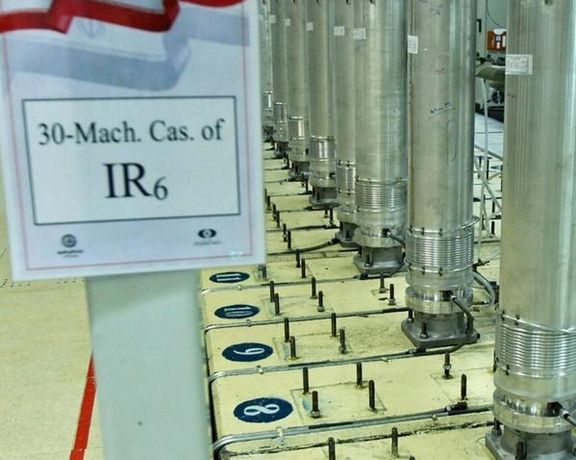
On Saturday, France, Germany, and Britain, original signatories of the 2015 nuclear deal with Iran, condemned Tehran’s latest actions to further expand its uranium enrichment.

On Saturday, France, Germany, and Britain, original signatories of the 2015 nuclear deal with Iran, condemned Tehran’s latest actions to further expand its uranium enrichment.
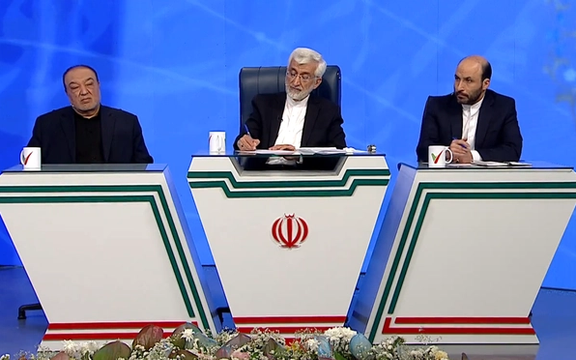
Ultra-hardliner candidate and former nuclear negotiator Saeed Jalili on Friday defended his own record in nuclear negotiations while strongly criticizing President Hassan Rouhani's government for its diplomacy.
“I told the previous [Rouhani] government that there were actions they had to take to eliminate the maximum pressure strategy [by the US against the Islamic Republic], but some people in that administration didn’t agree … In Mr. Raisi’s administration, however, these strategies were implemented, and consequently, the enemy confessed to the futility of the maximum pressure strategy,” Jalili said in his first economic discussion aired on state television.
The Trump administration withdrew from the Obama-era JCPOA nuclear agreement in 2018 and imposed crippling sanctions on Iran. Oil exports plunged from a high of 2.2 million barrels a day in 2017 to less than 300,000 in 2019.
This plunged Iran into a deep recession and led to inflation rates persisting at 50% until now. Although the economic crisis is the most pressing issue for most voters, candidates have avoided addressing Iran's foreign policy and nuclear program that have led to isolation and sanctions.
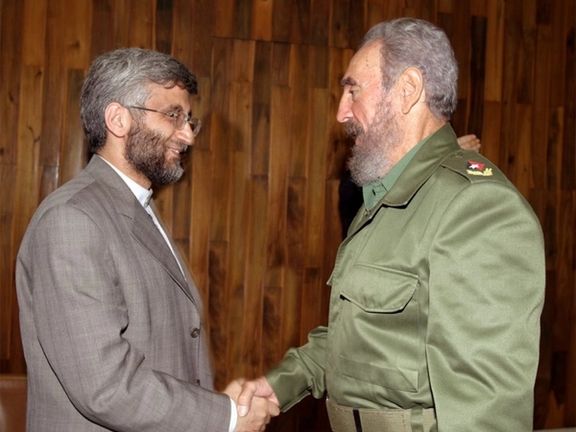
Jalili, former Secretary of the Supreme National Security Council and nuclear negotiator under populist Mahmoud Ahmadinejad, who formed a shadow government when Hassan Rouhani was elected president in 2013, has held the Rouhani administration responsible for the "doubling" of sanctions. He claimed that during Ebrahim Raisi's three-year presidency, Iran succeeded in increasing its oil exports.
“Constructive and extensive relations with the world are required for [improving] the economy. This happened during the tenure of Martyr Raisi. Now the US foreign secretary has to explain to the Senate why Iran can sell two million barrels of oil now,” he said.
Like other candidates, Jalili was accompanied by two economic advisers during his TV appearance. Three economic experts questioned the candidate and his advisers during the 45-minute program.
“Mr. Jalili’s foreign policy policies are a continuation of Dr. Raisi’s,” one of Jalili’s advisers, Deputy Foreign Minister Mehdi Safari, said while stressing that relations with neighboring countries, including economic relations, had improved during Raisi’s unfinished term of presidency. “Currently two-thirds of the red meat we need is imported from neighboring countries. Exports have increased and we have expanded the infrastructures,” he said.
During the discussion, Jalili came under attack from one of the experts who questioned his performance as Iran's nuclear negotiator. Ebrahim Mottaghi, a professor of economy at Tehran University, said there was no progress in the nuclear talks when Jalili was responsible from 2007-2013, and the situation developed into several UN resolutions against Iran.
“What tangible achievements did you make during your tenure that you want to continue the same policy as announced previously?” he asked Jalili.
“We will have a more pronounced presence in equations with an increase in our power,” Jalili said in response. He argued that during the time referred to by Mottaghi, the United States had a strong presence in Iraq and Afghanistan which it could not keep due to the effectiveness of the policies that the Islamic Republic had adopted.
“[The US] could not implement the plans it had for us and this was the result of [our] planning … I believe in reducing threats and maximum use of opportunities as [a desired] outcome of foreign policy rather than mere trips and meetings with foreign [officials],” Jalili said.
“Why is the enemy and hostile media networks more sensitive about you than other candidates?” Foad Izadi, another expert on the panel who shares Jalili’s economic views, asked him. Jalili implied in his response that he was targeted, as the question suggested, because they expect him to succeed like Raisi allegedly did in defeating the maximum pressure strategy against the Islamic Republic.
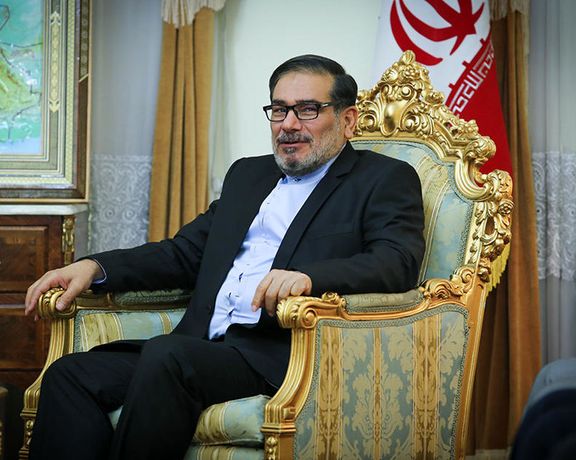
Ali Shamkhani, advisor to the Supreme Leader and apparent nuclear negotiator, stated on Friday that Iran "won't bow to pressure" amidst US warnings regarding its uranium enrichment activities.
“Iran's nuclear program relies on national will and development strategy,” Shamkhani wrote on X. “The US and some Western countries would dismantle Iran’s nuclear industry if they could.”
The US issued a warning to Iran, stating they will “respond accordingly” if Iran continues to accelerate its nuclear program. This came shortly after the UN nuclear watchdog, the International Atomic Energy Agency (IAEA), highlighted Tehran's expanding uranium enrichment.
The IAEA’s report revealed Iran's response to a censure resolution, indicating expanded uranium enrichment at two underground sites. Iran rapidly installed more uranium-enriching centrifuges at its Fordow site and began work on additional ones at its Natanz facility, the report said.
A week ago, The IAEA's Board passed a resolution urging Iran to cooperate and reverse its decision to bar inspector visits, with the US stressing the need for Iran's compliance. Britain, France, and Germany tabled the resolution, which the US reportedly opposed but later endorsed. Only Russia and China voted against the measure.
Shamkhani, an old-guard military figure who served as the secretary of Iran’s Supreme National Security Council until last year, had previously warned of a "serious and effective response" if European nations pursued the resolution.
According to an IAEA assessment, Iran is enriching uranium to 60% purity, approaching the 90% threshold typical of weapons-grade material. Additionally, it has accumulated enough material for additional enrichment, potentially resulting in three nuclear warheads.
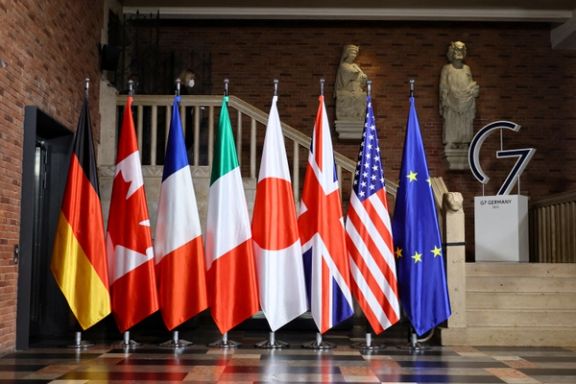
The Group of Seven leaders warned Iran on Friday against advancing its nuclear enrichment program, adding they would be ready to enforce new measures if Tehran were to transfer ballistic missiles to Russia.
"We urge Tehran to cease and reverse nuclear escalations, and stop the continuing uranium enrichment activities that have no credible civilian justifications," according to a draft communique.
Iran has rapidly installed extra uranium-enriching centrifuges at its Fordow site and begun setting up others, a UN nuclear watchdog report said on Thursday.
Iran is now enriching uranium to up to 60% purity, close to the 90% of weapons grade, and has enough material enriched to that level, if enriched further, for three nuclear weapons, according to an IAEA yardstick.
"Iran must engage in serious dialogue and provide convincing assurances that its nuclear program is exclusively peaceful, in full cooperation and compliance with the IAEA’s monitoring and verification mechanism, including the Board of Governors’ resolution of 5 June," the G7 said.
Iran says its nuclear program is solely for peaceful purposes.
The leaders also warned Iran about concluding a deal to send ballistic missiles to Russia that would help it in its war against Ukraine, saying they were prepared to respond with significant measures if it were to happen.
"We call on Iran to stop assisting Russia’s war in Ukraine and not to transfer ballistic missiles and related technology, as this would represent a substantive material escalation and a direct threat to European security," they said.
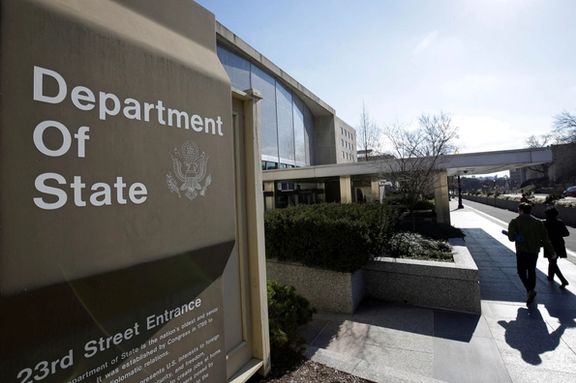
The United States on Thursday threatened to respond to Iran if it further accelerates its uranium enrichment, hours after the UN nuclear watchdog, the IAEA warned that Tehran has increased its capacity.
The US State Department issued a statement warning Iran of its response. “The report issued today by the IAEA makes clear that Iran aims to continue expanding its nuclear program in ways that have no credible peaceful purpose. These planned actions further undermine Iran’s claims to the contrary. If Iran implements these plans, we will respond accordingly.”
The International Atomic Energy Agency issued a report on Thursday saying Iran has responded to last week's UN nuclear watchdog censure resolution by expanding its uranium enrichment capacity at two underground sites. Iran has rapidly installed two more cascades, or clusters, of uranium-enriching centrifuges at its Fordow site and begun work on more while also planning others at its underground plant at Natanz.
"On 9 and 10 June ... Iran informed the Agency that eight cascades each containing 174 IR-6 centrifuges would be installed over the next 3-4 weeks in Unit 1 of FFEP (Fordow Fuel Enrichment Plant)," the confidential International Atomic Energy Agency report sent to member states on Thursday said.
"On 11 June 2024, the Agency verified at FFEP that Iran had completed the installation of IR-6 centrifuges in two cascades in Unit 1. Installation of IR-6 centrifuges in four additional cascades was ongoing," the report said, referring to one of one of Iran's most advanced centrifuge models.
The IAEA Board passed a resolution a week ago calling on Iran to step up cooperation with the agency and reverse its recent decision to bar visits by inspectors.
The resolution was tabled by Britain, France and Germany, which the United States reportedly opposed but later endorsed. Only Russia and China voted against the measure.
The US statement further stated: Iran must cooperate with the IAEA without further delay to fully implement its legally binding safeguards obligations. Until Iran does so, the IAEA Board of Governors will continue to hold Iran to account. We remain in close coordination with our partners and allies and are prepared to continue to increase pressure on Iran should its non-cooperation with the IAEA continue.
Ali Shamkhani, a senior aide to Iran's Supreme Leader, who has been reportedly put in charge of Iran's nuclear negotiations, had warned that Iran would deliver a "serious and effective response" if European nations pursue the resolution.
Iran’s enrichment of uranium to 60% purity in the past two years has no credible civilian use and is viewed as a steppingstone to 90% weapons grade enrichment. The time needed to produce the fissile material for a bomb by further enriching from 60 to 90 percent is just a few weeks, putting Iran in the position of an early nuclear threshold country.
The 2015 nuclear agreement between Iran and world powers had capped enrichment to less than 5% for more than a decade, but former US President Donald Trump withdrew from the agreement known as the JCPOA in 2018 and imposed sanctions on Iran. He argued that that 2015 deal was weak and had a limited restraining life span, demanding a tougher agreement.
Iran’s response during the remaining two years of the Trump term was relatively limited, increasing enrichment to just 5%. However, after President Joe Biden’s election and his declaration to strive for the restoration of the Obama-era agreement, Iran hardened its position, demanding the lifting of US sanctions and accelerating enrichment first to 20% in early 2021, and then 60% later.
Multi-lateral negotiations lasting 18 months to restore the JCPOA failed once Russia invaded Ukraine and Iran began supplying drones to Moscow in mid-2022.
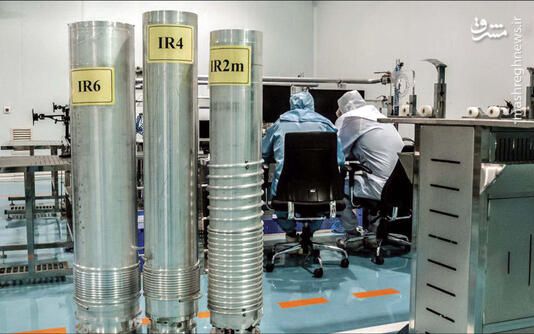
Iran has responded to last week's UN nuclear watchdog censure resolution by expanding its uranium enrichment capacity at two underground sites.
Iran has rapidly installed two more cascades, or clusters, of uranium-enriching centrifuges at its Fordow site and begun work on more while also planning others at its underground plant at Natanz, a UN nuclear watchdog report seen by Reuters said.
"On 9 and 10 June ... Iran informed the Agency that eight cascades each containing 174 IR-6 centrifuges would be installed over the next 3-4 weeks in Unit 1 of FFEP (Fordow Fuel Enrichment Plant)," the confidential International Atomic Energy Agency report sent to member states on Thursday said.
"On 11 June 2024, the Agency verified at FFEP that Iran had completed the installation of IR-6 centrifuges in two cascades in Unit 1. Installation of IR-6 centrifuges in four additional cascades was ongoing," the report said, referring to one of one of Iran's most advanced centrifuge models.
While non-binding, resolutions by the International Atomic Energy Agency's 35-nation Board of Governors anger Tehran, which typically responds by accelerating its nuclear activities.
Eighteen months earlier, Iran responded to a similar resolution by enriching uranium to up to 60% purity—close to weapons-grade—at a second site and announcing a significant expansion of its enrichment program.
Reuters cited unnamed diplomats as saying Wednesday that this time Tehran plans to install more cascades, or clusters, of centrifuges, the machines that enrich uranium, at both its underground enrichment sites.
"It's not as much as I would expect," one Vienna-based diplomat said, referring to the scale of Iran's escalation. "Why? I don't know. Maybe they're waiting for the new government," they said, referring to the death in a helicopter crash last month of Iranian President Ebrahim Raisi and Foreign Minister Hossein Amir-Abdollahian. The presidential election is due to be held on June 28.
The IAEA Board passed a resolution a week ago calling on Iran to step up cooperation with the agency and reverse its recent decision to bar visits by inspectors.
The resolution was tabled by the Britain, France and Germany, which the United States reportedly opposed but later endorsed. Only Russia and China voted against the measure.
Ali Shamkhani, a senior aide to Iran's Supreme Leader, who has been reportedly put in charge of Iran's nuclear negotiations, had warned that Iran would deliver a "serious and effective response" if European nations pursue the resolution.
Iran’s nuclear chief Mohammad Eslami claimed earlier this month that Tehran is adhering to the Nuclear Non-Proliferation Treaty (NPT) agreements, but is “in the process of reducing its nuclear obligations” under the 2015 nuclear deal, known as the Joint Comprehensive Plan of Action (JCPOA). The E3 maintains that Iran has signed and ratified the NPT Safeguards Agreement but has not adhered to its legally binding obligations.
In 2018, then-US President Donald Trump withdrew from the JCPOA, arguing that the agreement did not sufficiently prevent Tehran from acquiring a nuclear weapon. Consequently, the US re-imposed unilateral sanctions on Iran's economy.
Reuters sources did not go into specifics on the number or type of centrifuges being added or what level they would enrich to, though one diplomat said they would not be used to quickly expand Iran's production of uranium enriched to up to 60%, close to the 90% required for production of atomic bombs.
The diplomats said they would wait to see what the IAEA said Iran had actually done but they were aware of Iran's plans. The move is "at the lower end of expectations and something we're pretty sure they were going to do anyway", one diplomat said, meaning it would have happened even without the resolution.
Iran did not fully follow through on its November 2022 announcement of a tough retaliation after the previous resolution. While it installed all the centrifuges it said it would at its underground enrichment plant at Natanz, 12 cascades of one advanced model, the IR-2m, are not yet in operation.
Iran is only enriching to up to 60% at an above-ground pilot plant at Natanz and its Fordow site, which is dug into a mountain. In November 2022 it started enriching to up to 60% at Fordow but it has yet to install all the additional cascades it said it would.
IAEA Chief Rafael Grossi acknowledged last week that the agency has lost continuity of knowledge regarding the production of centrifuges, rotors and bellows, heavy water, and uranium as Iran continues to expand its nuclear program.
In response to a question by Iran International’s Ahmad Samadi about the censure resolution by the European countries, Grossi stated that the member countries must express their opinions on the matter and that the Agency is only required to comply with the resolution if it is approved.
"Iran has taken further steps in hollowing out the JCPoA, by operating dozens of additional advanced centrifuges at the Natanz enrichment site as well as announcing it will install thousands more centrifuges at both its Fordow and Natanz sites." the joint statement said, referring to the Joint Comprehensive Plan of Action signed with Iran in 2015.
Centrifuges are machines that enrich or purify uranium to up to 90%, which can be used to produce nuclear weapons. Iran has been enriched to 60% purity since 2022 in retaliation for the US withdrawal from the JCPOA in 2018.
Iran has also substantially reduced the ability of the UN nuclear watchdog, the International Atomic Energy Agency (IAEA), to monitor its nuclear facilities. IAEA’s Board of Governors passed a resolution on June 4 censuring Iran and demanding from Tehran to cooperate with the agency. Iran vowed to retaliate and days later informed the watchdog about the expansion of its enrichment.
"This decision is a further escalation of Iran’s nuclear program, which carries significant proliferation risks," it added.
The joint statement stressed that "Iran’s decision to substantially increase its production capacity at the underground Fordow facility is especially concerning".
"Iran is legally obliged under the Non-Proliferation Treaty to fully implement its safeguards agreement, which is separate to the JCPoA."
The United States on Thursday had also threatened to respond to Iran if it further accelerates its uranium enrichment, hours after the UN nuclear watchdog, the IAEA warned that Tehran has increased its capacity.
The US State Department issued a statement warning Iran of its response. “The report issued today by the IAEA makes clear that Iran aims to continue expanding its nuclear program in ways that have no credible peaceful purpose. These planned actions further undermine Iran’s claims to the contrary. If Iran implements these plans, we will respond accordingly.”